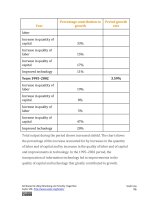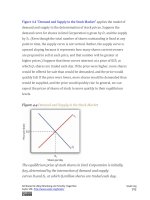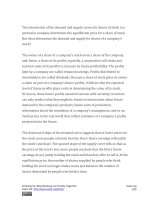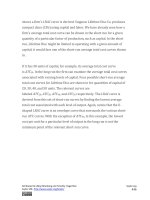Authors libby rittenberg 472
Bạn đang xem bản rút gọn của tài liệu. Xem và tải ngay bản đầy đủ của tài liệu tại đây (523.4 KB, 1 trang )
were routinely beaten by the Taliban’s religious police. He toldThe Wall
Street Journal, “This was very bad for them, but it was good for me.”
Of course, Mr. Islamadin was not the only producer to get into the industry.
Other Afghani merchants, as well as merchants from Pakistan and China,
also jumped at the opportunity.
The entry of new firms exemplifies an important characteristic of perfect
competition. Whenever there is an opportunity to earn economic profits—
even an unexpected opportunity—new firms will enter, provided that
entry is easy.
The model of perfect competition also assumes that exit will be easy if and
when a firm experiences economic losses. When the Taliban rulers were
ousted by the United States and its allies in 2001, Mr. Islamadin expected
that the demand for burkhas would begin to fall. It did. The sales fell 50%
almost immediately. Prices fell as well, generally by about 20%.
It was simple for Mr. Islamadin to leave the industry. He gave his
remaining stock of burkhas to a brother who was producing them in the
countryside where women continued to wear them. As for Mr. Islamadin,
he has made plans to go into the glassware business. He expects the
demand for glass teacups to be strong whatever happens in Afghanistan’s
critical future.
Source: Andrew Higgins, “With Islamic Dress, Out Goes the Guy Who Sold
Burkhas,” The Wall Street Journal, December 19, 2001, p. A1.
ANSWERS TO TRY IT! PROBLEMS
1. Not perfectly competitive–There are few sellers in this market (Fedex,
UPS, and the United States Postal Services are the main ones in the
Attributed to Libby Rittenberg and Timothy Tregarthen
Saylor URL: />
Saylor.org
472









